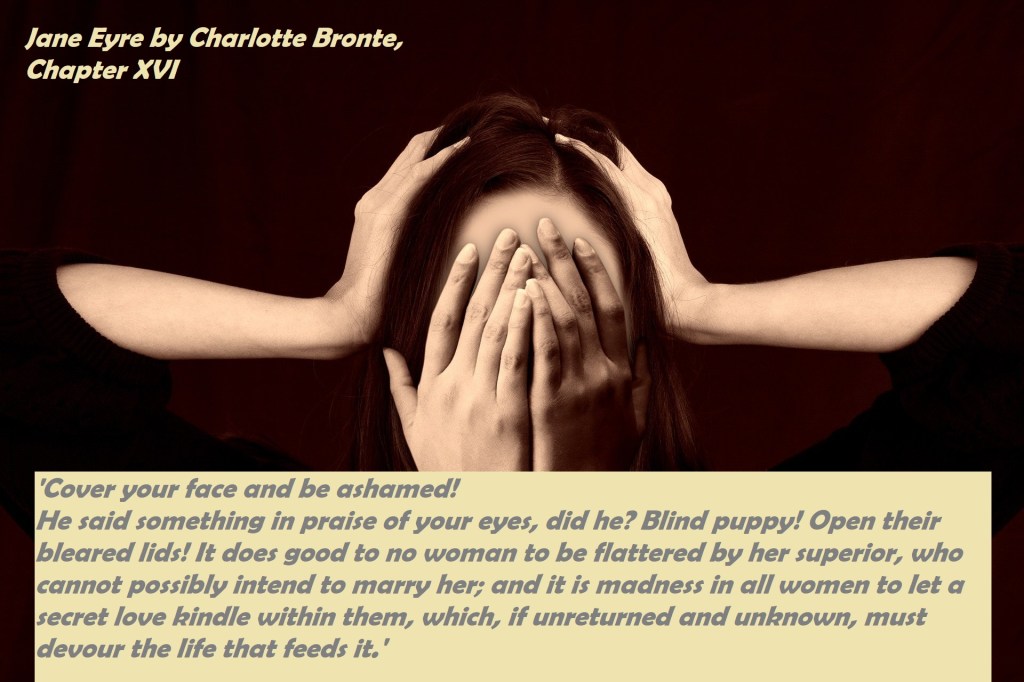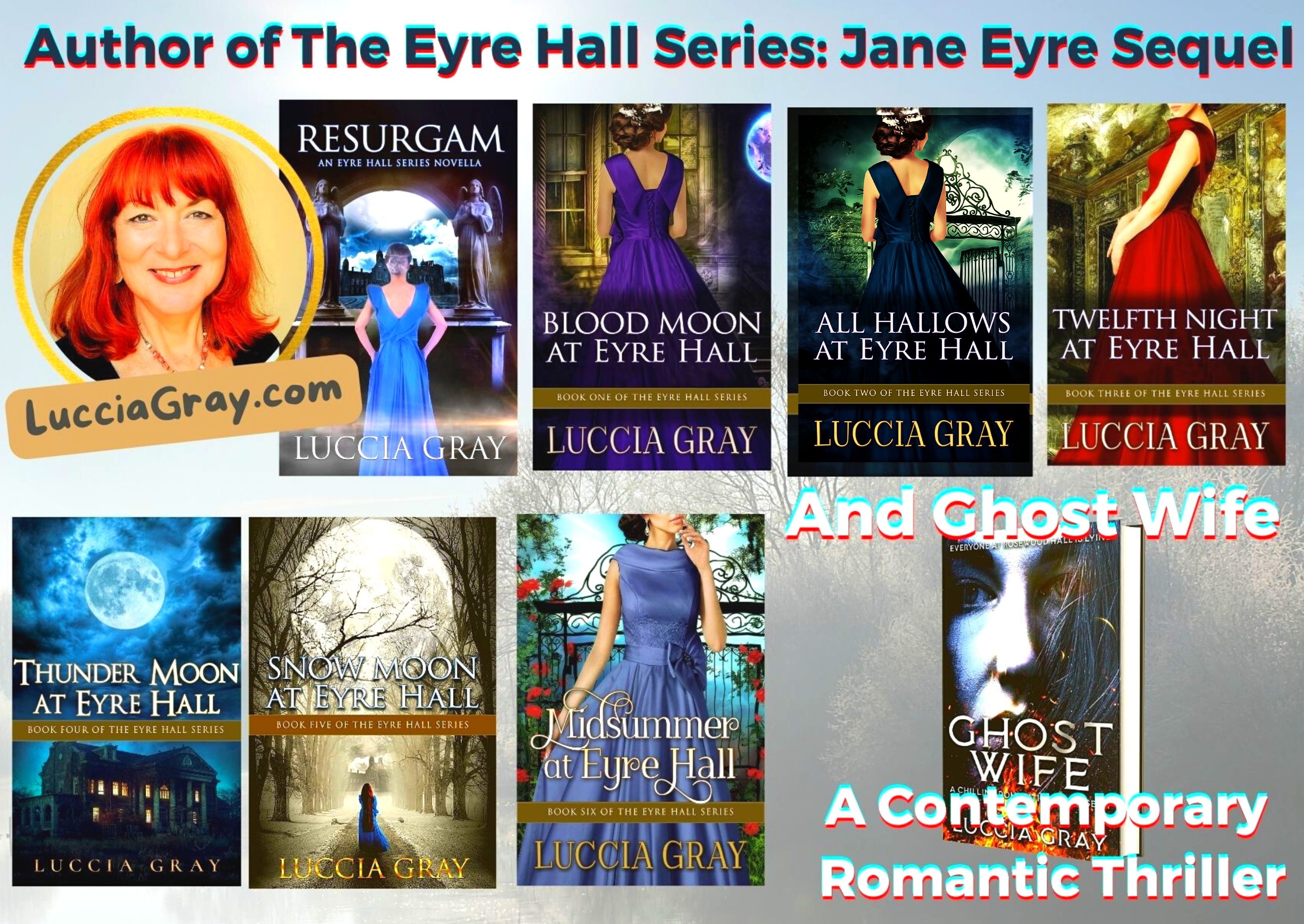Jane Eyre in Flash Fiction Chapter XVI
How I realised I was no rival for Blanche Ingram, an accomplished lady of rank.
I both wished and feared to see Mr. Rochester on the day which followed this sleepless night. During the early part of the morning, I momentarily expected his coming; he did step into the schoolroom for a few minutes sometimes, but nothing interrupted the quiet course of Adele’s studies.
After breakfast I heard some bustle in Mr. Rochester’s chamber and the servants’ voices, discussing the fire, which they attributed ton a candle. ‘What a mercy master was not burnt in his bed!’
I saw through the open door that all was again restored to complete order. Leah stood was rubbing the panes of glass dimmed with smoke. Grace Poole sat on a chair by the bedside, staid and taciturn-looking, as usual, in her brown stuff gown, check apron, white handkerchief, and cap, intent on sewing rings to new curtains.
She said ‘Good morning, Miss,’ in her usual phlegmatic and brief manner. I did not see any evidence of a woman who had attempted to murder her employer, who had, as I believed, charged her with the crime. She looked up, while I gazed at her: no consciousness of guilt, or fear of detection.
‘Good morning, Grace,’ I said. ‘Has anything happened here?’
‘Master fell asleep with his candle lit, and the curtains got on fire; but, fortunately, he awoke before the bed-clothes or the wood-work caught, and contrived to quench the flames with the water in the ewer.’
‘Did Mr. Rochester wake nobody? Did no one hear him move?’
She seemed to examine me warily and answered. ‘Mrs. Fairfax’s room and yours are the nearest to master’s; but Mrs. Fairfax said she heard nothing. Perhaps you may have heard a noise?’
‘I heard a strange laugh.’
She spoke with perfect composure—‘It is hardly likely master would laugh when he was in such danger. You must have been dreaming.’
‘I was not dreaming,’ I said.
‘Have you told master that you heard a laugh?’ she inquired.
‘I have not had the opportunity of speaking to him this morning.’
‘You did not think of opening your door and looking out into the gallery?’ she further asked.
The idea struck me that if she discovered I knew or suspected her guilt, she would be playing of some of her malignant pranks on me; I thought it advisable to be on my guard.
‘On the contrary,’ said I, ‘I bolted my door.’
‘It will be wise so to do,’ was her answer.
I was dumfoundered at what appeared to me her miraculous self-possession and most inscrutable hypocrisy.
Cook told me Mrs. Fairfax was waiting for me: so I departed, puzzling my brains over the enigmatical character of Grace Poole, and wondering why she had not been given into custody or dismissed from her master’s service.
After classes, when Adele left me to play in the nursery with Sophie, I keenly listened for the bell to ring below with a message from Mr. Rochester which did not arrive. Still it was not late; he often sent for me at seven and eight o’clock, and it was yet but six. Surely I should not be wholly disappointed to- night, when I had so many things to ask him!
Leah made her appearance to intimate that tea was ready in Mrs. Fairfax’s room. Thither I repaired, glad at least to go downstairs; for that brought me, I imagined, nearer to Mr. Rochester’s presence.
‘You must want your tea,’ said the good lady, as I joined her; ‘you ate so little at dinner. Are you not well today? You look flushed and feverish.’
‘Oh, I never felt better.’
‘It is fair tonight, though not starlight. Mr. Rochester has, on the whole, had a favourable day for his journey.’
‘Is Mr. Rochester gone anywhere?’
‘He set of the moment he had breakfasted! He is gone to the Leas, Mr. Eshton’s place, ten miles on the other side Millcote. I believe there is quite a party assembled there; Lord Ingram, Sir George Lynn, Colonel Dent, and others.’
‘Do you expect him back to-night?’
‘No—nor tomorrow either; I should think he is very likely to stay a week or more: when these fine, fashionable people get together, they are so surrounded by elegance and gaiety, so well provided with all that can please and entertain, they are in no hurry to separate. Mr. Rochester is so talented and so lively in society, that I believe he is a general favourite: the ladies are very fond of him; I suppose his acquirements and abilities, perhaps his wealth and good blood, make amends for any little fault of look.’
‘Are there ladies at the Leas?’
‘There are Mrs. Eshton and her three daughters—very elegant young ladies indeed; and there are the Honourable Blanche and Mary Ingram, most beautiful women. Blanche came here to a Christmas ball and party Mr. Rochester gave six years ago. You should have seen the dining-room that day—how richly it was decorated, how brilliantly lit up! I should think there were fifty ladies and gentlemen present—all of the first county families; and Miss Ingram was considered the belle of the evening.’

‘What was she like?’
“Miss Ingram was certainly the queen. Tall, fine bust, sloping shoulders; long, graceful neck: olive complexion, dark and clear; noble features; eyes rather like Mr. Rochester’s: large and black, and as brilliant as her jewels. And then she had such a fine head of hair; raven- black and so becomingly arranged: a crown of thick plaits behind, and in front the longest, the glossiest curls I ever saw. She was dressed in pure white; an amber-coloured scarf was passed over her shoulder and across her breast, tied at the side, and descending in long, fringed ends below her knee.’
‘She was greatly admired, of course?’
‘Yes, indeed: and not only for her beauty, but for her accomplishments. She and Mr. Rochester sang a duet.’
‘Mr. Rochester? I was not aware he could sing.’
‘Oh! he has a fine bass voice, and an excellent taste for music.’
‘And Miss Ingram: what sort of a voice had she?’
‘A very rich and powerful one. Mr. Rochester said her execution was remarkably good.’
‘And this beautiful and accomplished lady, she is not yet married?’
‘It appears not: I fancy neither she nor her sister have very large fortunes. Old Lord Ingram’s estates were chiefly entailed, and the eldest son came in for everything almost.’
‘But I wonder no wealthy nobleman or gentleman has taken a fancy to her: Mr. Rochester, for instance. He is rich, is he not?’
‘Oh! yes. But you see there is a considerable difference in age: Mr. Rochester is nearly forty; she is but twenty-five.’
‘What of that? More unequal matches are made every day.’
‘True: yet I should scarcely fancy Mr. Rochester would entertain an idea of the sort. But you eat nothing: you have scarcely tasted since you began tea.’
‘No: I am too thirsty to eat.’
When once more alone, I reviewed the information I had got; looked into my heart, examined its thoughts and feelings, and endeavoured to bring back with a strict hand into the safe fold of common sense.
That a greater fool than Jane Eyre had never breathed the breath of life; that a more fantastic idiot had never surfeited herself on sweet lies, and swallowed poison as if it were nectar.
‘YOU,’ I said, ‘a favourite with Mr. Rochester? YOU gifted with the power of pleasing him? YOU of importance to him in any way? Go! your folly sickens me. Poor stupid dupe!
Cover your face and be ashamed! He said something in praise of your eyes, did he? Blind puppy! Open their bleared lids! It does good to no woman to be flattered by her superior, who cannot possibly intend to marry her; and it is madness in all women to let a secret love kindle within them, which, if unreturned and unknown, must devour the life that feeds it.
‘Listen, Jane Eyre, you are no match for the beautiful Blanche Ingram, an accomplished lady of rank. You are a governess, disconnected, poor, and plain.’
I had reason to congratulate myself on the course of wholesome discipline to which I had thus forced my feelings to submit. Thanks to it, I was able to meet subsequent occurrences with a decent calm, which, had they found me unprepared.
****
In the first part of this chapter, Jane is astonished that Mr Rochester has informed the staff that he provoked the fire by falling asleep with a lighted candle in the room, and subsequently put it out with his ewer. Grace Poole has not been reprimanded or dismissed, and implicitly denies any hand in the event. There is another allusion to Bertha’s presence in this chapter as she tells Grace Poole that she heard strange laughter. Grace suggests that Jane bolt her room at night.
Jane is looking forward to asking Mr Rochester about this strange turn of events, but Mrs Fairfax informs her that he has left to visit his friends, the Eshton’s, where he will stay for some weeks, at a party for fine, fashionable people. The reader, like Jane wonders what’s going on in the third story. The staff, and especially Grace Poole are hiding something or someone, who could be dangerous.
The second part of the chapter is devastating for Jane. Poor Jane feels that her employer has made a fool of her by pretending to enjoy her company. She learns that he is popular with the ladies, which is something he had already told her, but she naively thought it was in his past. She also learns she has a specific rival for his affections in the beautiful and accomplished Blanche Ingram, who is looking for a rich husband, as her brother will inherit her father’s entailed estate.
We learn that Jane had hoped to marry Mr Rochester. ‘It does good to no woman to be flattered by her superior, who cannot possibly intend to marry her;’, but she realises she is no match for Blanche Ingram. She chastises herself for believing a poor governess could aspire to marry her wealthy employer. The first-time reader will think she is probably right, or perhaps not? But why has Mr Rochester taken French leave? Has he been toying with Jane? When will he come back? Is he looking for a bride?
After a brief period of happiness, our young heroine is dejected once more. Where will Jane go from here? Will she stay and watch him marry another woman, or will she leave? And what about the strange laughter on the third floor?
The plot thickens! See you next week for chapter XVII.
The summary is based on the free ebook by planet books which you can find here.
I’ll be posting a chapter of Jane Eyre in flash fiction every Friday. If you’re wondering why, read all about it here.
If you’d you’d like to Reread Jane Eyre with me, visit my blog every Friday for #JaneEyreFF posts.
See you next week for chapter 16.
Images from Pixabay



